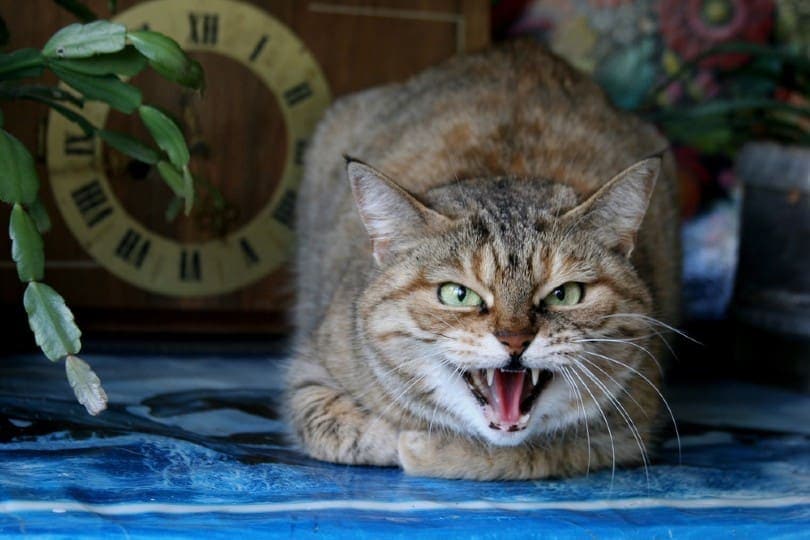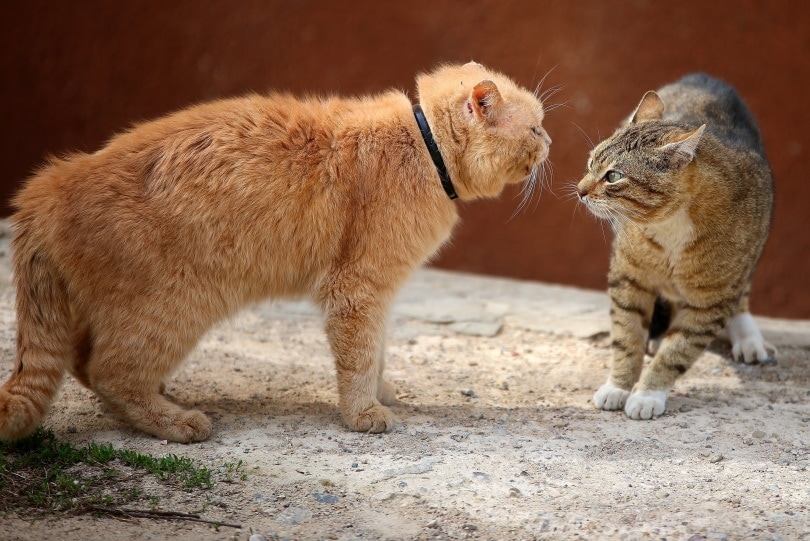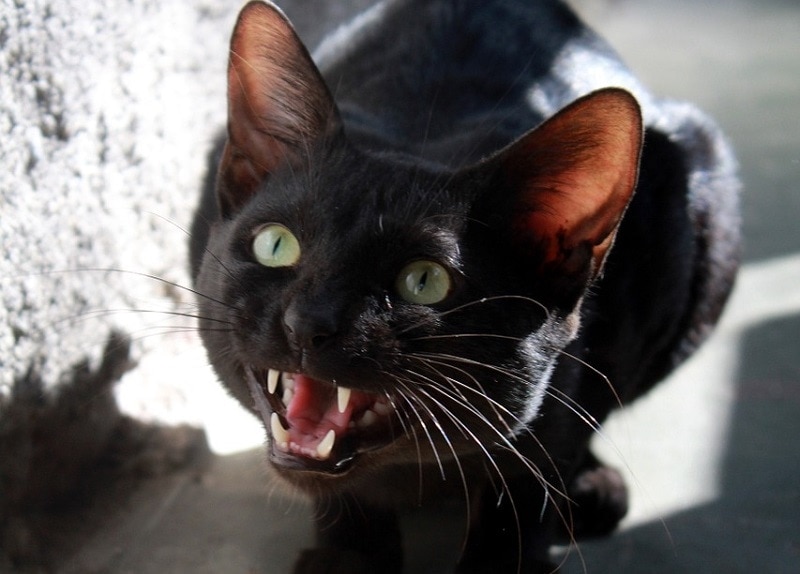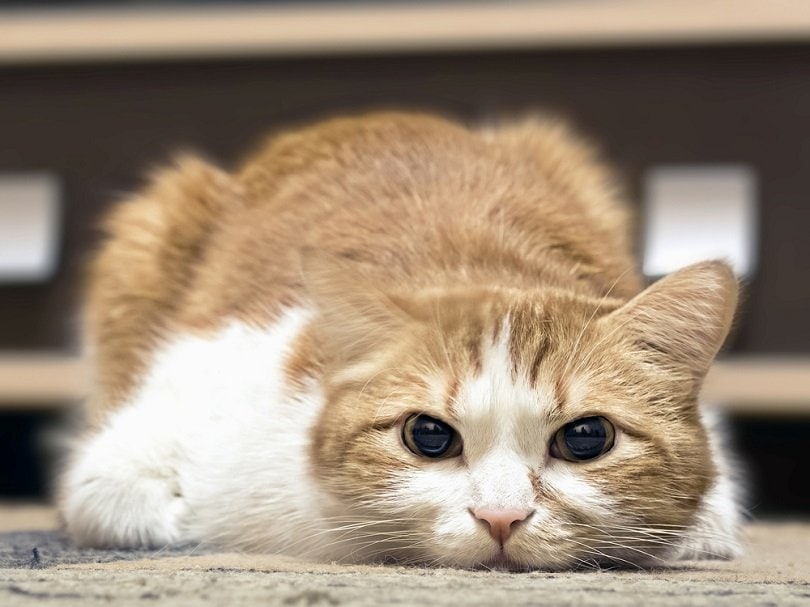
Cats have a pretty wide range of vocalizations. Some of them stem from pleasure, curiosity, attention-seeking, displeasure, irritation, fear, and so on. So, when your cat is growling, you could automatically conclude it is probably a negative connotation.
But why exactly did they do this? Well, it can be for a variety of reasons. In this article, we’re going to explore exactly what would trigger growling in a cat.
Disclaimer: Always Consult Your Vet
Before we begin on the handful of reasons why your cat might be growing, it’s important to mention it to your veterinarian. If these changes are sudden and you are having trouble getting to the bottom of this behavioral change, it could be due to an underlying health condition.
Your vet can give your cat an examination and look at a few key pieces of information to see whether additional testing is needed.
The 7 Reasons Cats Growl
1. Your Cat Is Asserting Dominance

Some cats might growl to assert dominance. If they are having a standoff with another cat, that is either a household mate or an unfamiliar feline, they can have a showdown from time to time.
Growling can indicate that the other cat is on their turf, and they want to get it back off. Cats can also growl at humans for the same reason. If your cat feels like you are invading their space, growling can very easily display as a territorial tendency.
In these circumstances, the cat is often saying that they will resort to other measures if necessary. If the warning isn’t taken seriously or the person or animal in question won’t take a hint, it might lead to hissing, scratching, or even attacking.
2. Your Cat Is Annoyed
Quite frankly, your cat might have had enough of everybody’s shenanigans. Whether there’s a little kid wanting to be in the cat’s face or petting them aggressively, or an unwanted dog around wanting to play, your cat can growl in response.
It might not be necessarily an act of aggression, but rather a warning, letting the other party know that they just don’t want to be messed with right now. If it is from agitation only, your cat will normally flee the situation once they have had enough.
However, if they are continuously growling at another person or animal in the home, it’s best to get to the underlying reason so you can come up with a solution. For example, if small children in the home seem to be tormenting the cat, it might be time to have a talk with the kids about space.
Or, if another dog or cat won’t seem to leave them alone, constantly trying to engage, it might be time to set up some firm boundaries.
3. Your Cat Is Afraid

Plenty of things can spark fear in our otherwise fearless felines. Whether it’s a completely new stimulus in the environment or familiar noise, your cat is bound to get triggered from time to time.
If they are in a situation where they feel uncomfortable or unsafe, it is extremely common and even understandable for them to growl. This is simply a response to their surroundings and a firm way of saying, “I don’t like this.”
If you feel your cat is afraid, try to remove them from the stimuli causing the reaction.
4. Your Cat Is Being Possessive
Is the growling occurring around the food bowl? Many cats show food aggression, especially if they weren’t properly socialized as kittens. During the crucial stages of kittenhood, littermates will battle over the food and the kittens will learn to eat.
If a kitten is taken away from its mother too early, it can cause dysregulation in the way that they handle normal daily tasks. If your cat is hovering over the food bowl, guarding it with his life and growling at anyone who comes in the area, this could be a scarcity mindset.
It is extremely common with stray and feral kittens that haven’t had proper guidance early on.
5. Your Cat Feels Cornered or Trapped

If you back the kitty into the corner, you’re going to get the claws! If a cat is feeling cornered or trapped, it’s only natural that they would growl or show some form of warning or aggression. This plays into being frightened, but it puts them in a more dire situation.
For example, if your dog is trying to play and your cat can’t escape them, they may growl or hiss to defend their position.
6. Your Cat Is Feeling Stressed
If there have been a lot of changes happening around the house recently or a routine is out of whack, your cat might be feeling very stressed out. If they are dealing with a lot of these uncomfortable emotions, it can create unusual behaviors, like growling.
Know that if the underlying reason is stress, the growling should stop once the heightened emotion subsides. You might have to implement some creative ways to make your kitty feel more at ease.
7. Your Cat Is in Pain

If this behavior is sudden, it might be because your cat is in pain. If you can’t identify any environmental trigger that would create this kind of reaction, you might want to pay attention to your cat’s body language.
Certain illnesses, injuries, and chronic diseases can make your cat very uncomfortable. If you notice your cat growling when you touch them in a specific spot or seeming to shy away from any sort of physical affection, it might be time to make an appointment with your veterinarian.
Often, age can play a role in this issue, as their joints don’t work how they once did. But it can also be other issues that cause problems to the skin or internal organs, making the body sensitive to touch. Your vet can run any additional testing necessary.
Never Touch a Growling Cat!
No matter how close you and your kitty are, try to never touch them if they are growling. Growling is a warning and should be dealt with accordingly. Try to back off and give your kitty some space until they’ve calmed down.
If you try to touch a growling cat, they might scratch, bite, or harm you in some way unintentionally. This will be a response to whatever the trigger is and can do a lot more harm than good.
After all, not only can this hurt you, but it can make whatever is upsetting your cat feel worse and take longer to recover from.

Final Thoughts
We would like to reiterate that any and all behavioral changes that seem abnormal to you will need to be addressed with your vet. They have an ongoing relationship with your cat and understand their medical history.
If you could easily identify the underlying trigger, try to avoid making your cat uncomfortable enough to growl. Typically, new changes will become old news or you can easily make changes to help your kitty feel calm again.
Featured Image Credit: pixbull, Shutterstock






